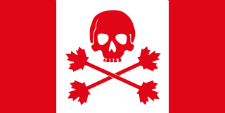 The International Intellectual Property Alliance (IIPA) has released its latest 301 ‘watch list’ submission to the U.S. Government.
The International Intellectual Property Alliance (IIPA) has released its latest 301 ‘watch list’ submission to the U.S. Government.
The IIPA, which includes a wide range of copyright groups including the MPAA, RIAA, and ESA, has listed its complaints against a whole host of countries. As in previous years, Canada is discussed in detail with the recommendation to put it on the 2017 Special 301 ‘watch list.’
One of the main criticisms is that, despite having been called out repeatedly in the past, the country still offers a home to many pirate sites.
“For a number of years, extending well into the current decade, Canada had a well-deserved reputation as a safe haven for some of the most massive and flagrant Internet sites dedicated to the online theft of copyright material,” IIPA writes.
The group notes that some progress has been made. For example, last year the Canadian authorities actively helped to shut down the popular torrent site KickassTorrents, which was partly hosted there. However, the rightsholders say that there’s more work to be done.
“Nonetheless, major online piracy operations still find a home in Canada. These include leading BitTorrent sites such as Sumotorrent.sx and Seedpeer.eu, and hybrid cloud storage services utilizing BitTorrents, such as cloudload.com.”
Another disturbing development, according to IIPA, is the emergence of stand-alone BitTorrent applications that allow users to stream content directly through an attractive and user-friendly interface, hinting at Popcorn Time.
In addition to the traditional pirate sites that remain in Canada, IIPA reports that several websites offering modified game console gear have also moved there in an attempt to escape liability under U.S. law.
“In a growing and problematic trend, sites selling circumvention devices that have been subject to DMCA takedown notices from right holders in the U.S. are moving to Canadian ISPs for hosting, to evade enforcement action under U.S. law. Canadian hosting services such as Hawk Host and Crocweb are particularly popular with such sites.”
The group specifically highlights R4cardmontreal.com, gamersection.ca and r4dscanada.com among the offenders, and notes that “This trend breathes new life into Canada’s problematic ‘safe haven’ reputation.”
The recommendation continues by stressing that Canada’s legal regime fails to deal with online piracy in a proper manner. This is also true for the “notice and notice” legislation that was adopted two years ago, which requires ISPs to forward copyright infringement notices to pirating subscribers.
IIPA notes that there is no evidence that this initiative has resulted in a significant change in consumer behavior, in part because there are no punishments involved for frequent offenders.
“…simply notifying ISP subscribers that their infringing activity has been detected is ineffective in deterring illegal activity, because receiving the notices lacks any meaningful consequences under the Canadian system,” IIPA writes.
This is even worse for hosting providers and other Internet services, who currently have no legal incentive to take infringing material down, IIPA argues.
“The ‘notice-and-takedown’ remedy that most other modern copyright laws provide is far from a panacea for online piracy, but it does, at a minimum, provide some incentives for cooperation, incentives that Canada’s laws simply lack.”
In addition, IIPA notes that a broad range of third-party services such as advertisers, payment processors, and domain name registrars are all too often abused to facilitate piracy. They believe that this is in part because Canadian law doesn’t offer enough “motivation” for these companies to cooperate.
The rightsholders hope that the U.S. Government can help to steer Canada in another direction and encourage more and better anti-piracy regulation. If not, they fear that Canada will remain a safe haven for pirates during the years to come.
IIPA’s full submission, which highlights a variety of countries which deserve a spot on the 301 Watch Lists per IIPA’s standards, is available here (pdf).





